
High On The Hog—November 2017, Canadian Packaging
By Andrew Joseph, Features Editor; Photos by Walter Janzen
Automation Food Safety General Sustainability British Retail Consortium Canadian Food Inspection Agency CFIA Fomaco Global Food Safety Initiative HACCP Handtmann Canada Limited holac Maschinenbau GmbH Jarvis Canada Limited Kentmaster Manufacturing Co. Leibinger Group Loma Systems (Canada) Inc. Marel Maurer-Atmos Middleby GmbH PAL Distributors Inc. Reiser (Canada) Co. Sealed Air Corporation Seydelmann KG slideshow The Progressive Group Treif Maschinenbau GmbH United States Department of Agriculture USDA VARIOVAC PS SystemPack GmbH Videojet Technologies Canada Ltd. Winkler Meats Ltd. Winpak Ltd.Manitoba pork processor leverages robust thermoforming packaging technology to boost its line efficiencies and product shelf appeal
Putting pork on the forks of millions of meat-loving consumers may not be everybody’s idea of an easy way to earn one’s daily bread and butter.
But for the hard-working folks at Winkler Meats Ltd. in Winkler, Man., producing a diverse variety of high-quality fresh and processed pork products is a labor of love that has been growing stronger by the day with the passage of time ever since the company’s inception back in 1964.
Founded and operated by the Dyck family for 45 years until its 2009 acquisition by The Progressive Group, Winkler Meats offers a textbook case of a small farming operation blossoming into an industry stalwart through strong work ethic, unyielding focus on product quality and innovation, and proactive investment in modern-day processing and packaging technologies to maintain a strong competitive edge in a cutthroat marketplace.
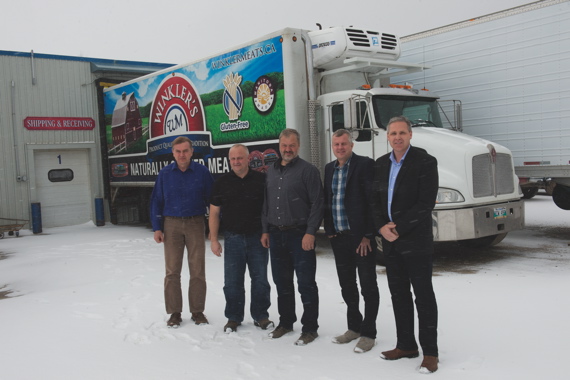
From Left: Some of Winkler Meats’ senior management team braving the weather outside their southern Manitoba production facility include controller Gerry Hoeppner, production manager Chris Graham, general manager Frank Isaak, director of sales and marketing Brian Benedictson, and vice-president Jeff Senebald.
Located on the western edge of Manitoba’s Red River Valley about 120 kilometers south of Winnipeg, Winkler is a welcoming community of some 12,591 residents, according to last year’s Canadian Census, that serves as the unofficial industrial hub of southern Manitoba.
As part of the Progressive Group, which maintains a stock of approximately 35,000 sows to supply the pork producer’s federally-inspected abattoir and processing facility, Winkler Meats is an integral component of that hub, as well as a key contributor to the local economy.
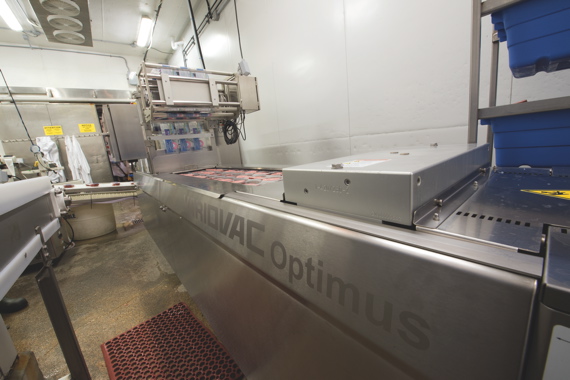
In June of 2017, Winkler Meats installed a brand new Variovac Optimus thermoforming machine, supplied by Reiser (Canada) Co., capable of producing fully-sealed packages at robust throughput speeds of over 12 cycles per minute.
“Our present-day operations like on-site slaughter, deboning, processing, packaging and shipping are all run much like they did for 45 years by the Dyck family, albeit on a much grander scale,” Winkler Meats vice-president Jeff Senebald told the Canadian Packaging magazine in a recent interview.
“The Progressive Group supplies approximately 95 per cent of Winkler Meats’ live animal requirements, enabling Winkler Meats to boast the Verified Canadian Pork certification on its packaging,” says Senebald, citing the company’s diverse and growing product portfolio comprising over 50 varieties of sausage and cured products.
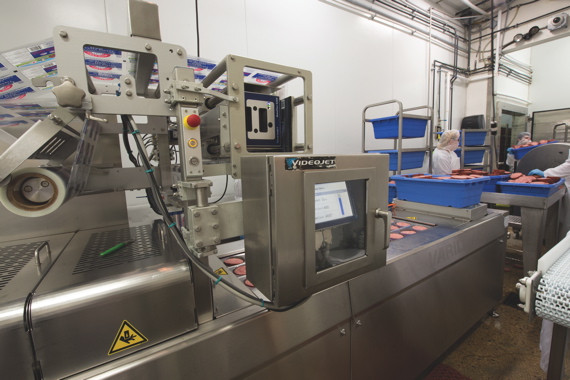
Installed on top of the Variovac Optimus thermoforming machine supplied to the Winkler Meats facility by Reiser (Canada) Co., a Videojet model DataFlex 6420 thermal-transfer printer applies the best-before/freeze-by dates and lot code numbers to the top film layer just prior to sealing.
While the company used to slaughter and process beef in the past, the change of ownership saw the slaughterhouse transitioned into a pork-only operation.
Any other meats processed at the site—including beef and turkey—are shipped in boxes of pre-cut portion to go right into processing and, curing and packaging.
Boasting a fully-validated approach HACCP (hazard analysis and critical control points) and BRC (British Retail Consortium) accredited under GFSI (Global Food Safety Initiative)-certification for food safety from the Canadian Food Inspection Agency (CFIA), the 20,000-square-foot processing facility has recently obtained the critically important USDA (United States Department of Agriculture) certification that now permits it to export its products to the U.S., Mexico and Japan, according to Senebald.
“Each year, we process over one million kilograms of local-reared meat into hams, wieners, deli meats and Farmer Sausage,” says Winkler Meats general manager Frank Isaak, noting that the plant produces over four million sausages per year.
Citing the aforementioned Farmer Sausage as the company’s signature brand, Isaak estimates that pork accounts for about 85 percent of the plant’s processing output, with 10 per cent for beef and the rest primarily for turkey.
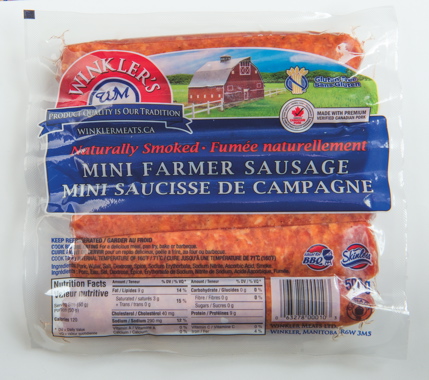
A variation of Winkler Meats best-selling Farmer Sausage brand, the Mini Farmer Sausage is a premium, traditional, naturally-smoked skinless sausage made with high-quality pork cuts and spices.
As Isaak explains, the company’s comprehensive farm-to-table capabilities are vividly supported by the abundant choice of products and packaging formats available for both its RTE (ready to eat) and NRTE (not ready to eat) products.
For example, the RTE product line-up includes smoked turkey thighs and drumsticks; Canadian back bacon chunks and deli meats; smoked pork loins (whole and sliced); smoked leg lams, old-fashioned
hams; and a rich variety of sausages comprising skinless smokies for foodservice, All Beef Hot Dogs, Diamond Dog all-pork wieners and the all-beef Game Day and Bomber Hot Dogs varieties.
For their part, the NRTE products include the company’s best-selling skinless, 100-percent Verified Canadian pork Farmer Sausage—offered in regular, mini, sliced and a crumbled pizza-toppings sizes—along with skinless Mild Italian Farmer Sausage, Breakfast Sausage, and a variety of private-label brands produced for some of western Canada’s major grocery retailers.
“We are also the only supplier to all of Winnipeg’s professional sports venues that are home to the NHL’s Winnipeg Jets, CFL’s Winnipeg Blue Bombers, the AAB’s baseball team Winnipeg Goldeyes, and the Winkler Flyers junior hockey team,” says Isaak, noting that all of the meat products manufactured by the plant’s 65 full-time employees are fully-certified as being gluten- and allergen-free.
While the plant currently operates a single daily shift, Isaak says there are plans being made to introduce a second shift in early 2018 to keep up with growing market demand, along with a longer-term plan to double the size of the current production facility.
“Our busiest time of year begins in April and runs through December, which means an increase in raw inventory to finished product,” says Isaak, citing consistently growing volumes at the plant’s slaughter, boning, processing and two packaging departments.
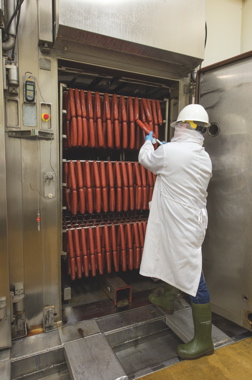
A Winkler Meats employee inserts a probe into a sausage curing inside one of the two Maurer ASR 3637 EL/WA computer-controlled friction smokehouses to monitor the smoking time and temperature levels.
As Isaac explains, the live hogs are delivered to Winkler Meats either before or day of the slaughter, and are housed in a holding barn until the transfer to abattoir.
After slaughtering, the carcasses are eviscerated and split by a Kentmaster Hog Saw, so that the hogs can then be dressed weight trimmed, rinsed and placed into a carcass cooler for chilling, to be ready for processing the very next day
The boning department then processes all slaughtered animals to meet all the mandated fresh pork specifications and Winkler Meats’ stringent sausage production requirements, with CFIA inspectors
checking the meat twice to ensure there is no contamination or excessive bacteria build-up.
“At this stage, the sows are cut to plant specification for further processing, including trimming specific cuts to meet our sausage production needs, placed into buckets and transferred to the processing cooler for further processing,” says Isaak.
“The market hogs are cut into primal cuts, bone-in and boneless loins, side and back ribs, bellies, legs, etc., after which they and are then vacuum-packed, boxed and sold as fresh cuts.”
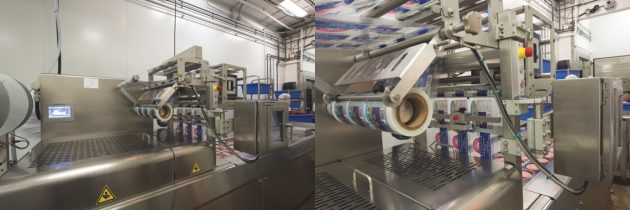
Winkler Meats recently switched from pre-printed plastic bags to rollstock pre-printed clear film—both supplied by Winnipeg’s Winpak Ltd., which in combination with the Variovac thermoforming machine supplied by Reiser has helped the meat processor see increased plastic consumption savings.
The processing department then uses select cuts of meat from the boning line and treats them with one of several Winkler Meats specially-formulated spice blends, after which the pork is ground, chopped and mixed using a Seydelmann grinder and/or a Seydelmann bowl chopper to meet the specs of each individual product recipe.
The processing department employs two Handtmann sausage stuffing machines that are able to apply either cellulose, fibrous, collagen or natural casing as required.
After stuffing, the product is transferred to one of two high-tech Maurer ASR 3637 EL/WA friction smokehouses for smoking and cooking.
These state-of-the-art smokers use two types of natural hardwood, with solid oak used to provide a smoke that gives the sausages its unique red color, and then hickory wood chips are added to infuse the
smoked flavor into the meat.
“Our smokers are computer-controlled to ensure product consistency,” states Isaak. “There are probes inserted into a few of the sausages in each batch entering the smoker to monitor temperature and time to ensure we create the perfect sausage every time,” he says, “as well as to ensure there is no opportunity for harmful bacteria to grow.”
With the skinless Farmer Sausage products, each batch stays in the low-temperature smoker, says Isaak, after which the sausages are cooled to meet stringent CFIA standards in preparation for packaging.
Isaak says that cured products are injected with a brine mixture via a Fomaco injector prior to smoking, after which they are gently tumbled and allowed to rest overnight before being smoked, cooking and transferred to the RTE cooler.
After racks of sausages, for example, are removed from the NRTE cooler, they are taken to the NRTE specific packaging department, where an operator moves all the designated “skinless” sausages through a Marel Townsend 2600 peeler, which uses a combination of steam and air to remove the cellulose casing around each sausage link.
The product is then hand-placed into the film pockets that are formed by the company’s newly-installed VARIOVAC Optimus thermoforming machine supplied by Reiser.
Purchased earlier this years from Burlington, Ont.-based Reiser (Canada) Co., and installed at the NRTE packaging department in June, the fully-automatic VARIOVAC Optimus horizontal form/fill/
seal packaging machine is equipped with Videojet’s DataFlex 6420 thermal-transfer printer to apply the best-before/freeze-by date and lot numbers.
Product then passes through a Loma IQ3+E metal detection product safety system before being boxed, palletized and placed into a shipping cooler.
The IQ3+E metal detection system was only installed at the Winkler Meats facility this past autumn.
“It’s been working very well for us, and we are quite happy with it,” says Isaak, adding that Winnipeg-based PAL Distributors sold them the Loma unit. “We also have plans to add a second Loma IQ3+E metal detection system when we undertake our expansion.”
He says that all natural and collagen casing sausages follow the same process flow, except for bypassing the peeler, while all the sliced products is put through the Treif Puma slicer prior to being packaged.
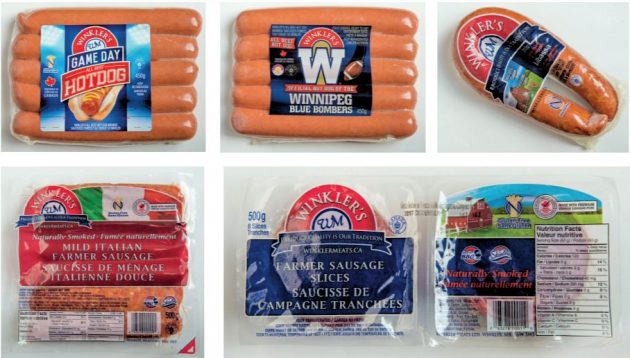
A sampling of Winkler Meats beef and pork sausage products, all of which are gluten- and MSG-free without any by-products added to ensure the consumer gets only a high-quality texture and flavor.
According to Isaak, the arrival of the VARIOVAC Optimus system has had a profound impact on the department’s productivity, despite being marketed by Reiser as an entry-level thermoforming machine.
“We use it to pack all of our NRTE products,” Isaak states, saying the operator-friendly machine is well capable of working three shifts a day, if required, with only minimal maintenance.
“It has doubled our output on some of our products within this department and increased all others,” Isaak extols, praising the compact machine’s modular design and heavy-duty, stainless-steel construction.
Designed to facilitate for quick-and-easy changes to package size changeovers, the VARIOVAC Optimus allows operators to store up to 40 pre-programmed recipes, while its removable covers and side panels makes it easy to prepare for cleaning and scheduled sanitary washdowns.
Equipped with Reiser’s proprietary RAPIDAIRSYSTEM that eliminates the need to pre-heat the packaging film, the VARIOVAC Optimus produces consistent high-quality packages and seals at speeds of more than 12 cycles per minute, depending on the product.
“Our VARIOVAC Optimus has been working extremely well for us,” Isaak asserts.
“It is easy to operate, and has provided our brands with a great seal and a great package on the retail shelf.
“Because we are very pleased with our dealings with Reiser,” offers Isaak, “we are currently working with them to supply us with the necessary equipment for our forthcoming expansion, which will include new thermoforming equipment on the RTE side.”
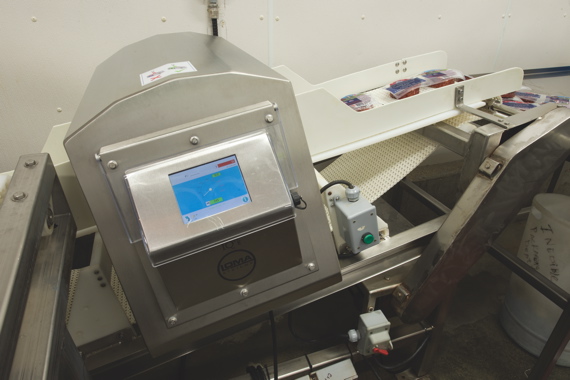
After sealing on the thermoforming machine, packs move through a Loma Systems
IQ3+E metal detection unit as part of Winkler Meats’ food safety program.
Currently, the RTE products—sliced by a Treif Puma slicer or cut into chunks on a Holac Cubixx 100 L dicer—are packed and sealed by Sealed Air Corporation’s Cryovac rotary vacuum-bag packer, with all pertinent dates and lot code data applied by a Leibinger Jet 3 inkjet printer—also supplied by PAL Distributors.
As Isaak explains, one of the biggest benefits of the RAPIDAIRSYSTEM system aboard the VARIOVAC machinery will be to lessen the plant’s reliance on using pre-printed plastic bags, supplied by Winnipeg-based Winpak, and switching to rollstock clear film also supplied by Winpak.
“With Reiser’s help, we determined that switching from plastic bags to plastic film could increase our packaging line efficiency, increase the quality and appearance of the packages, and could see significant savings in plastic consumption,” notes Isaak. “And we already have seen all of that.”
Like Isaak, Senebald says he is looking forward to the next Reiser machine installation at the Winkler Meats plant.
“We are a growing facility, thanks to the hard work of our employees and the quality recipes for our popular meat products,” sums up company vice-president Senebald.
“Along with our plans to expand across Canada and international markets, it is imperative that we continue to expand our production facilities and capacity, which include purchasing top-flight processing and packaging equipment.
“Thanks to Reiser, we have already notably improved our production line efficiency,” Senebald concludes, “and we look forward to working with them in the near future as we increase our capacity and grow into further success in the marketplace.”
Advertisement

